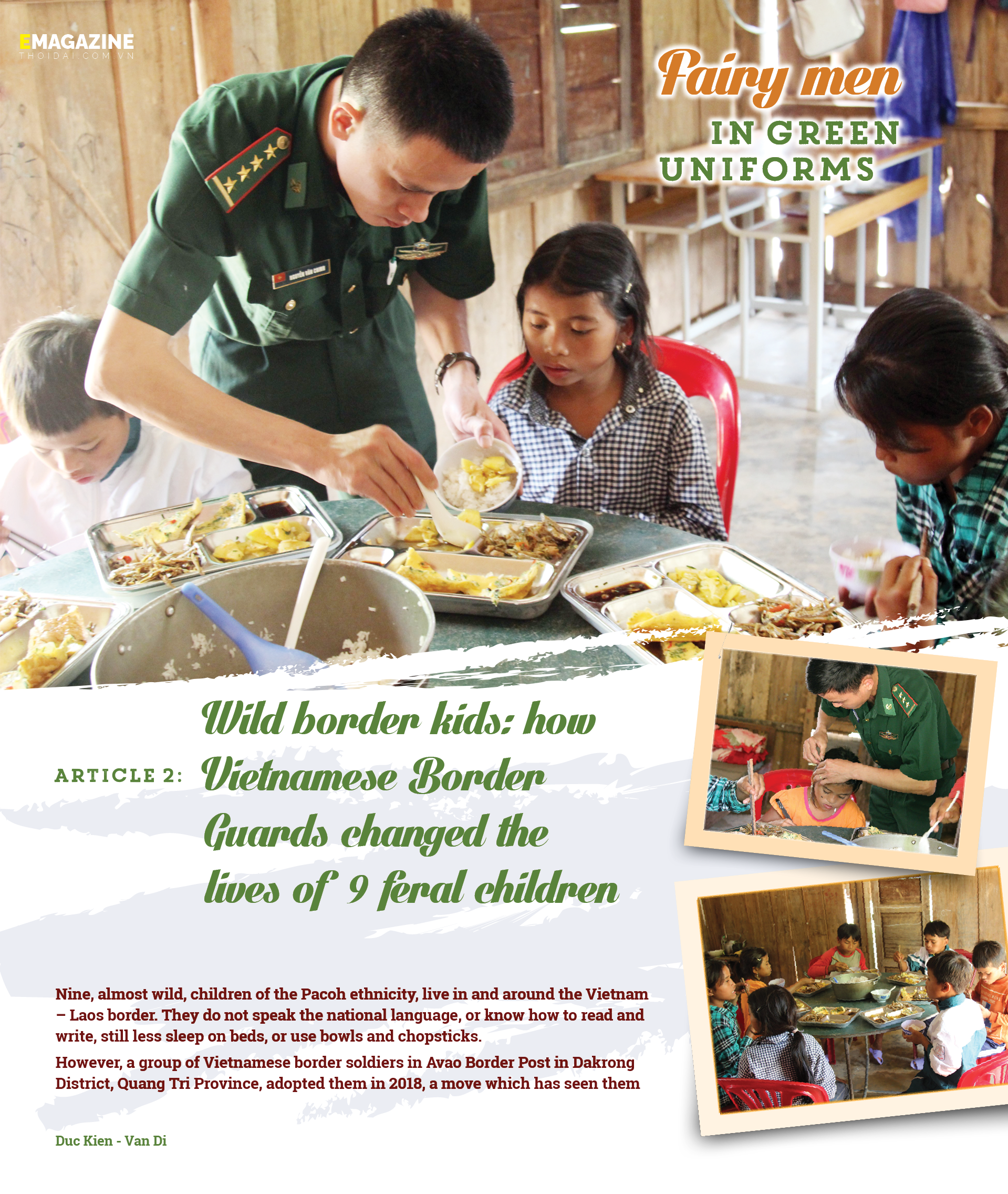 |
| The weather in late spring is not harsh, yet the 100-meter road from National Highway 14 to Avao Border Post is challenging as it crisscrosses multiple hills. Cars cannot pass through the road, so two border soldiers on motorbikes set in first gear, twist and turn on the road, releasing thick dark smoke as they crawl up the slope, on to the Truong Son mountain range. After huge flooding in 2020, the road was eroded by thousands of tons of soil and rock. Even motorbikes could not get through. For 6 months, there was only one way for the border guards here to stock-up on new supplies: by carrying goods on the backs and walking the slope. By the end of the year, an excavator took away the excess rock so motorbikes could finally pass. |
 |
| At 11 a.m. in a wooden house, a former classroom of Avao primary school besides the village military medical station, eight children rush in from a nearby classroom. They hang their schoolbags on spikes pinned on the wall, wash their hands and quickly sit on chairs around a table. Lieutenants Nguyen Tan Khiem and Nguyen Van Chinh open a steaming rice cooker and quickly scoop rice into bowls. Eggs are cut into slices, while crispy dried fish, with fried potatoes and onion in pig fat is hurried into food trays. "I invite you to enjoy the meal," the children shout together, before they attack their food, an array of spoons and chopsticks in hands. Lieutenants Khiem and Chinh stand behind the kids, reminding them of their manners: “Nuc, scoop the rice neatly please.” “Noan, remember to eat both rice and the side dishes!” Putting his hand in his uniform pocket, Lieutenant Khiem takes out some hair pins and gently arranges a girl’s messy hair. Khiem and Chinh monitor the children to neatly put the bowls into the sink after finishing, then to wash and take a quick nap before returning to class in the afternoon. “Nut, remember to pay attention to the lessons, don’t chitchat. Noan, remember to do all the homework” Khiem says fondly. |
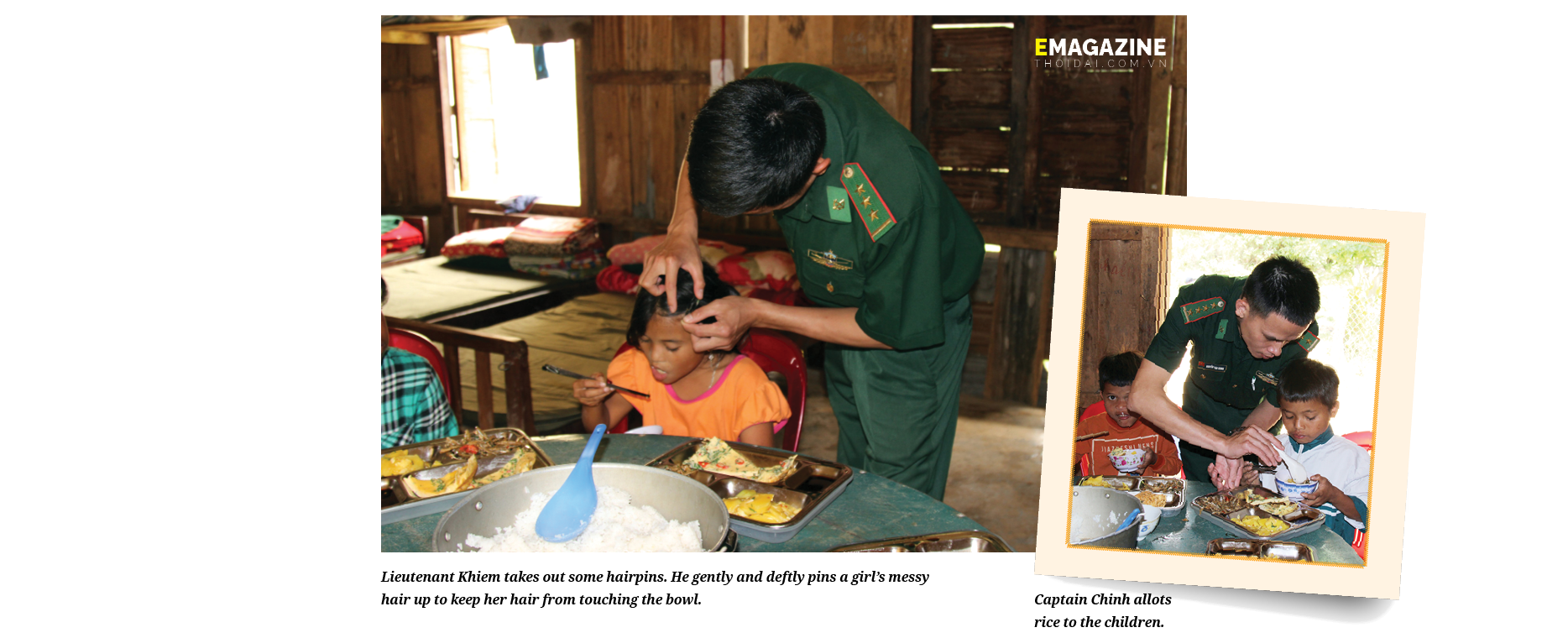 |
| Khiem says the children were born to a family who live separately near the borderline. To help them to go to school, Avao Border Post adopted nine of them, taking them to live close to the post. They take care of all the small details in the children’s lives, ferrying them to school every day. Last year, the eldest sister, at just 18 years old, got married. Eight other children still live near the post so that they can go to school. |
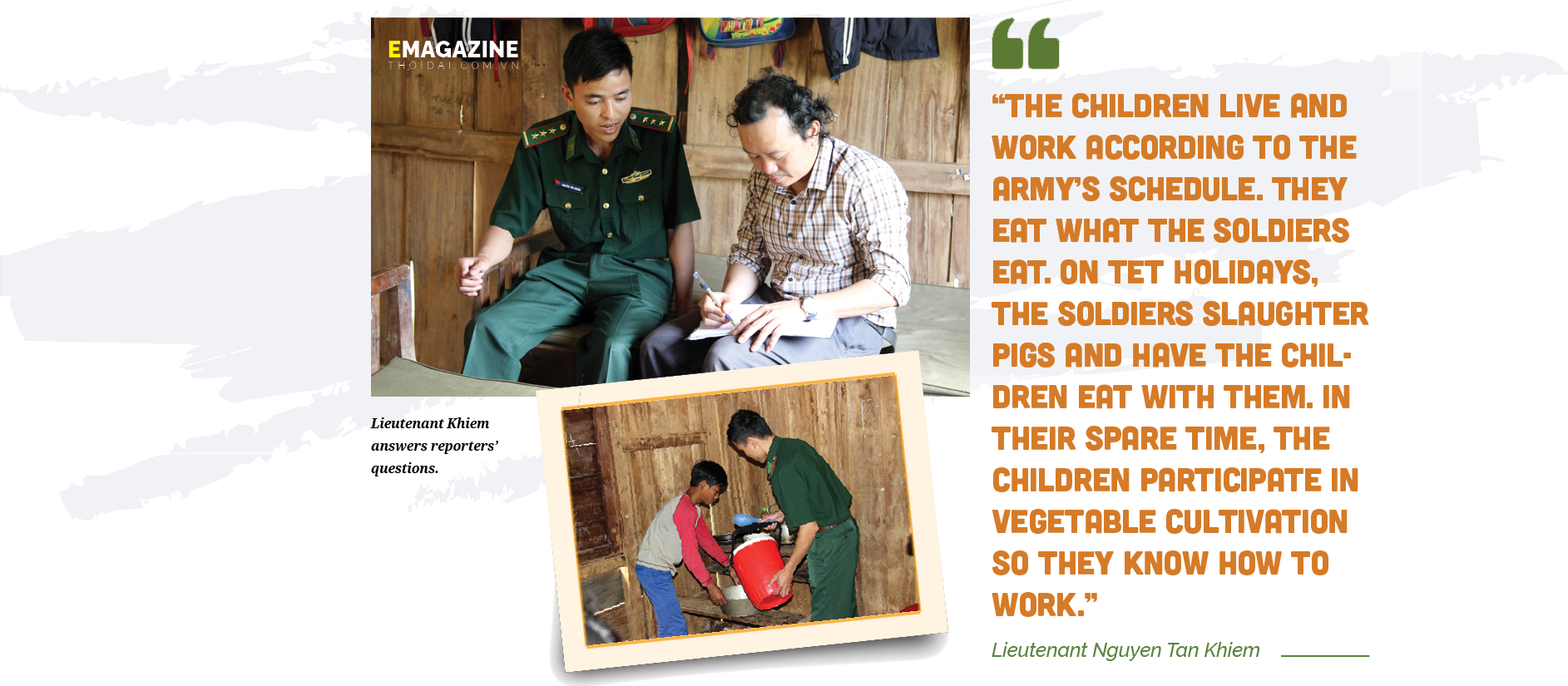 |
 |
| Colonel Ngo Duc Tuyen remembers the days when he first met the children at the border landmark. In 2018, Tuyen (then Senior Lieutenant Colonel, Head of Avao Border Post) patrolled the border once a month with his soldiers. One of the stops on the patrol was Ho Van Cuc’s house, located between landmarks 625 and 626 on the Vietnam-Laos border. This poverty-stricken area used to have dozens of Pacoh households. It’s a remote location and takes 3 hours travelling through forest to get to the Avao center. It’s so isolated it is impossible to go to school. But Ho Van Suc remains here. His father guarded the two landmarks here, and he won’t leave. |
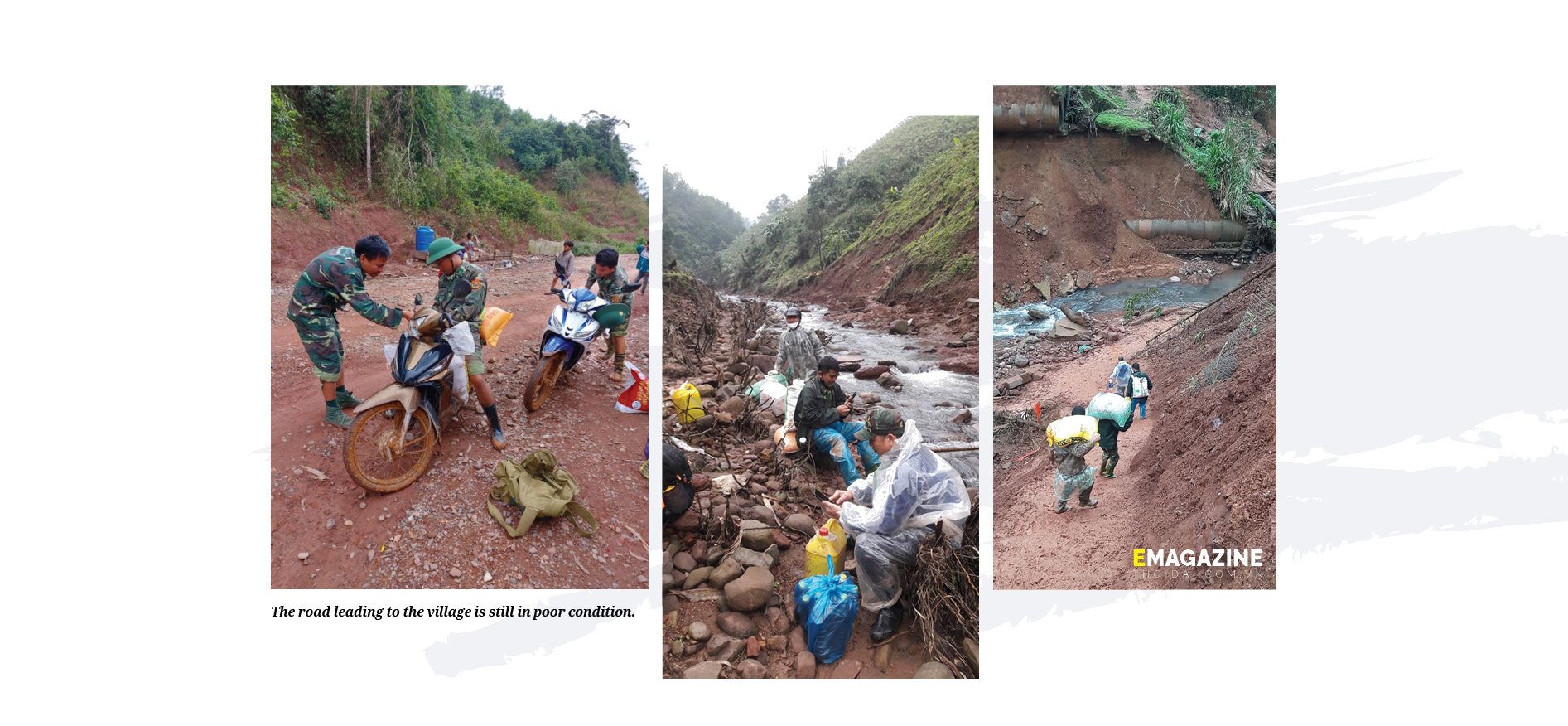 |
| Ho has 13 children, yet he is the only one who can speak a little of the national language. His children grew up wild and carefree, running amok with no friends other than each other. Each time the soldiers visited the house, they brought rice and instant noodles, and borrowed Ho’s kitchen to cook lunch, but on seeing this unruly gang of kids, their faces covered with dirt and sand, they couldn’t eat, leaving the food for the children instead. The children, without being urged, sit on the ground and ravenously attacking the noodles with their hands, stuffing the food into their mouths. |
 |
| Captain Ngo Duc Quyen couldn’t forget those early images of the children. After some sleepless nights, he held a lengthy meeting with the post’s key leaders, proposing to help bring the children back into society and send them to school. This was before, the Border Post Adoption movement had been launched At the end of the meeting, Colonel Ngo Duc Tuyen was unequivocal: “We are talking about dozens of human lives. If we do not bring these children here, they will grow up to be illegally logging and crossing the border. I will take responsibility for my decision, but to tell the truth, if there is no agreement among the comrades I will be unable to do so." After the meeting, the leaders sent a report to their supervisors. Captain Ngo Duc Tuyen met the secretary of Avao commune and Nguyen Thanh Binh, a teacher at Avao Primary and Secondary School Principal, to ask for their support. Both agreed to help, even promising to deduct a portion from the semi-boarding students’ rice rations to support the children. |
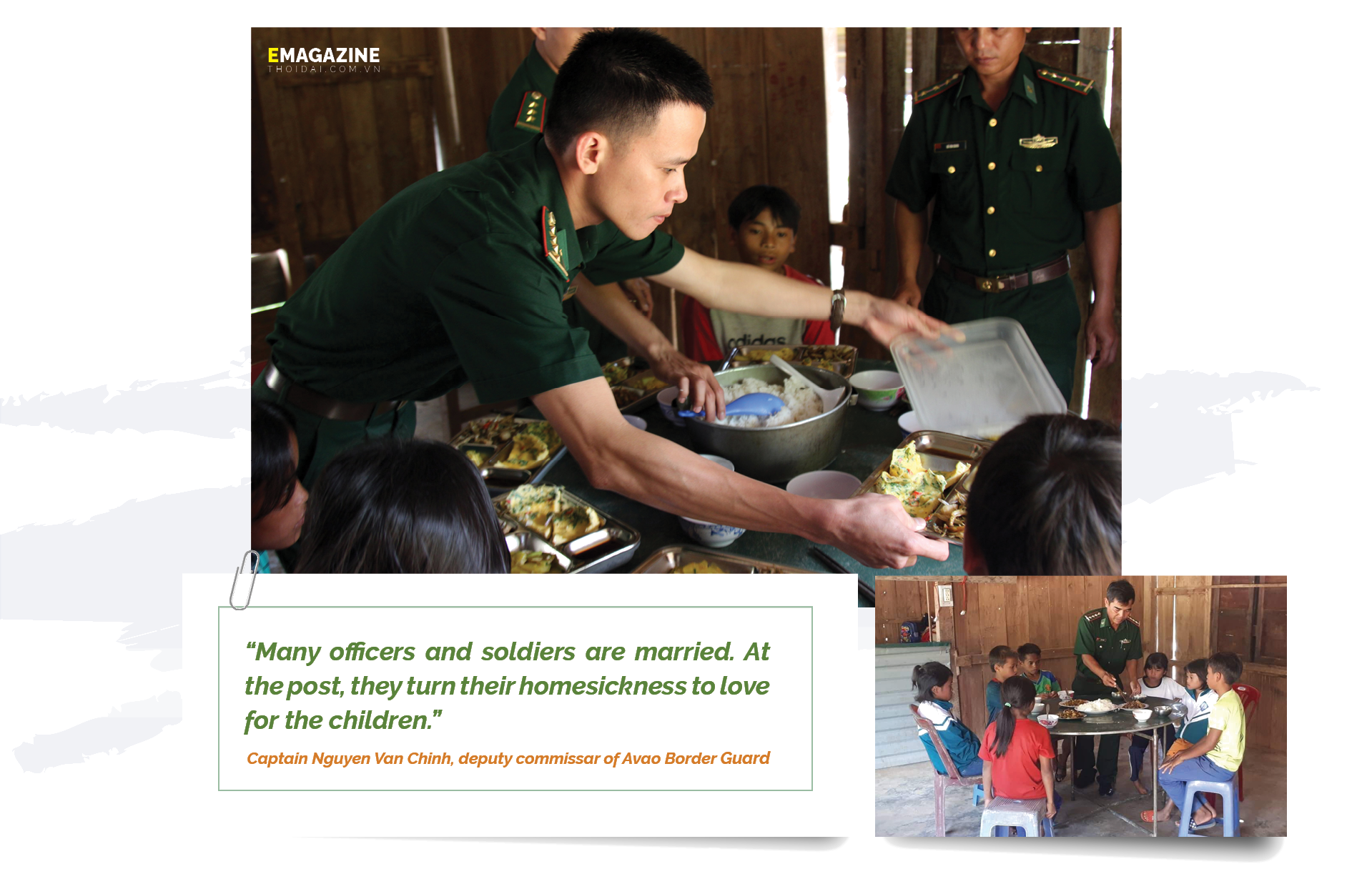 |
| With their supervisors’ consent, Avao Border Post start plans to bring the children back. They borrowed the old wooden house from the primary school, build three wooden beds, and buy blankets, curtains and living equipment. After all the preparation, a team of six soldiers trek across the forest road to Ho Van Tuc's house. It doesn’t take much to persuade the children, already familiar with the border guards, and they agree immediately to follow the soldiers back to the base. Eight children old enough to enter kindergarten and primary school are brought back along with their 16-year-old older sister. Although she does not go to school, she volunteers to help take care of her younger siblings. So, on a hot day in August, 2018, the six border soldiers carry guns on their shoulders and children on their back, and hike through the forest to Avao village, the three eldest children walking on their own. |
 |
| The first task is to bathe the children and send medical staff to check the children’s health. The soldiers have to help them settle in and get ready for the school year. The nine Pacoh children have never been in contact with anyone in society, other than the border guards. They are wild in the truest sense of the word. When it comes to meals, it is hard to arrange the children to sit neatly in chairs around the table. When food trays are brought out, they grab at them without waiting their turn, and sit on the floor as soon as they can to eat it. At night, the guide each child how to brush their teeth, and wash the hands and feet before bed. In the middle of the night, they use a flashlight to check on the children. But none of them are in bed. Instead they are hugging each other and sleeping under the bed. They are used to sleeping on the ground. |
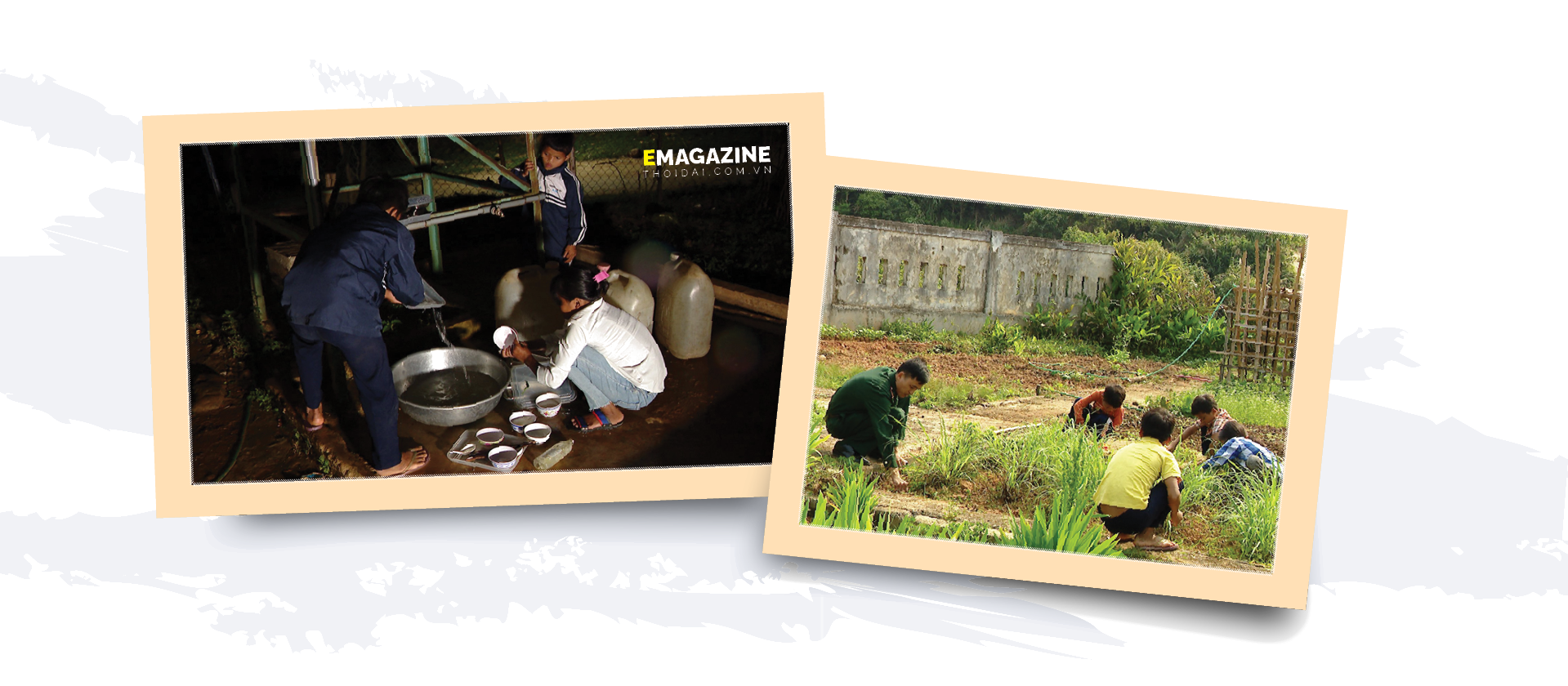 |
| Senior Lieutenant Ho Van Hung is appointed to take charge of the children's daily lives. Hung is a Van Kieu but he is also fluent in Pacoh and understands the ethnic group’s way of living. He also has two colleagues, military medical staff, who are happy to assist him. The first 3 months were the most difficult for the Border Guard soldiers, and school teachers. The children's personal hygiene was a challenge as they insisted on using the local bushes rather than a proper toilet. But as the days pass, the children slowly begin to change. They come to class regularly, read and write fluently, and learn how to do math. Their personal habits change and they focus on their studies. “We let the children eat and sleep according to the army's time. They eat what the soldiers eat. If the child does not obey, their most serious ‘fine’ will be being sent back to their old house,” says Colonel Ngo Duc Tuyen. “But after a few steps, they cry and apologize and promise to be good to go back to the post. Maybe they consider the post as their home now." |
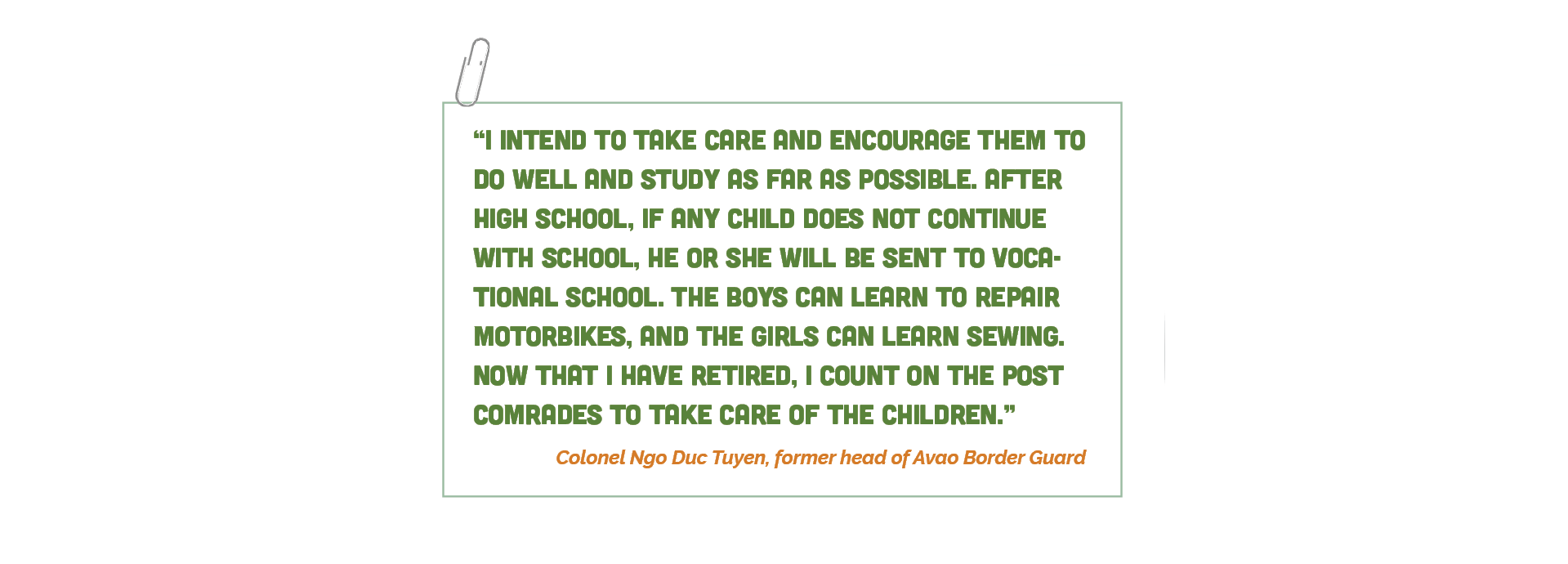 |